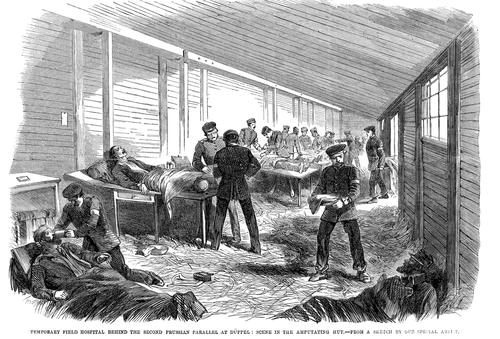 |
| 'Temporary field hospital behind the second Prussian parallel at Duppel: scene in the amputating-hut - from a sketch by our special artist’, Illustrated London News (May 7 1864) source |
Zola’s novel La Débâcle has this grim description of the
surgical removal of a wounded soldier’s arm in an improvised field hospital during the Franco-Prussian war.
Many would not have survived the operation for long.
Lisfranc’s method,
which surgeons never fail to speak of as a “very pretty” operation, something
neat and expeditious, barely occupying forty seconds in the performance.
The patient was
subjected to the influence of chloroform, while an assistant grasped the
shoulder with both hands, the fingers under the armpit, the thumbs on top.
Bouroche, brandishing
the long, keen knife, cried: “Raise him!” seized the deltoid with his left hand
and with a swift movement of the right cut through the flesh of the arm and
severed the muscle; then, with a deft rearward cut, he disarticulated the joint
at a single stroke, and presto! the arm fell on the table, taken off in three
motions.
The assistant slipped
his thumbs over the brachial artery in such manner as to close it. “Let him
down!” Bouroche could not restrain a little pleased laugh as he proceeded to
secure the artery, for he had done it in thirty-five seconds.
Émile Zola - La Débâcle (1892)
8 comments:
I just cannot conceive the horror of such a place.
That's terrible, wot about elf 'n' safety?
Actually, thinking about it, I remember arriving in Bahrain in the early '60s where the battalion was encamped on the end of runway #2. (Don't ask me why, something to do with Iraq, see, nothing changes!) Anyway, I was suffering with a verruca in my foot which pleased me enormously because I was thereby excused boots and put on light duties.
However, I was forced to consult the MO who asked me to kneel on a chair whilst he examined the sole of my foot. He then turned to his medical orderly, a huge man-mountain of a corporal, and told him to hold me which he did with embarrassing ease by simply wrapping his arms round me. The Doc then picked up my foot in much the same way as a blacksmith shoes a horse and began to cut the verruca out! Yeeeeeeees quite!
Well, not quite the same order of magnitude as having your arm removed but even so I regret to inform you that foul-mouthed expletives passed my tongue! Of course, it didn't work and in the end I was placed in the RAF hospital which was filled with 'hot 'n' cold' running 'char wallahs' - excellent! A new operation took place under anaesthetic which was successful but once back in my grotty tent I used to remove the dressing in order to allow the flies two minutes of feeding on the wound. ('Stoopid? Yes!) The dressing then went back on but the next day my foot swelled up beautifully and so back I went to the luxoury of the hospital. Alas, after two goes at this scam the Doc looked me in the eye and said with steely determination that he had better not see me ever again - or else! I got the message.
You see, it's true what the posters say, they do teach you a trade in the army - it's called 'skiving'!
Sorry to be such a bore!
My late father-in-law served in WWII in India and Burma. He told of a local wallah who used a bit of goat's horn to remove corns from soldiers' feet. Great service, quick as you like.
Could they find him a senior job in The Treasury?
Michael - I can't either, but Zola paints a vivid picture throughout the whole book.
David - I once cut out a verruca with a razor blade. It wasn't too bad because I did it so gently, sliver by sliver that I hardly felt a thing. I found the prospect of pain gave me the delicate touch of a master ivory carver.
Sackers - I wonder what is special about goat's horn?
Demetrius - there's no arm in suggesting it... oh dear!
So, chop it off and you might die or leave it on and die for sure of gangrene. After the Crimean battles a long dead relative survived the consequent cholera outbreak by staying in his tent and drinking nothing but rum for five days. Desperate days, desperate measures.
Roger - yes the amputations were Hobson's choice. In many cases a quick death might have been better. Your relative must have been hardy to survive on rum and retain a sense of why he had to do it that way.
Post a Comment